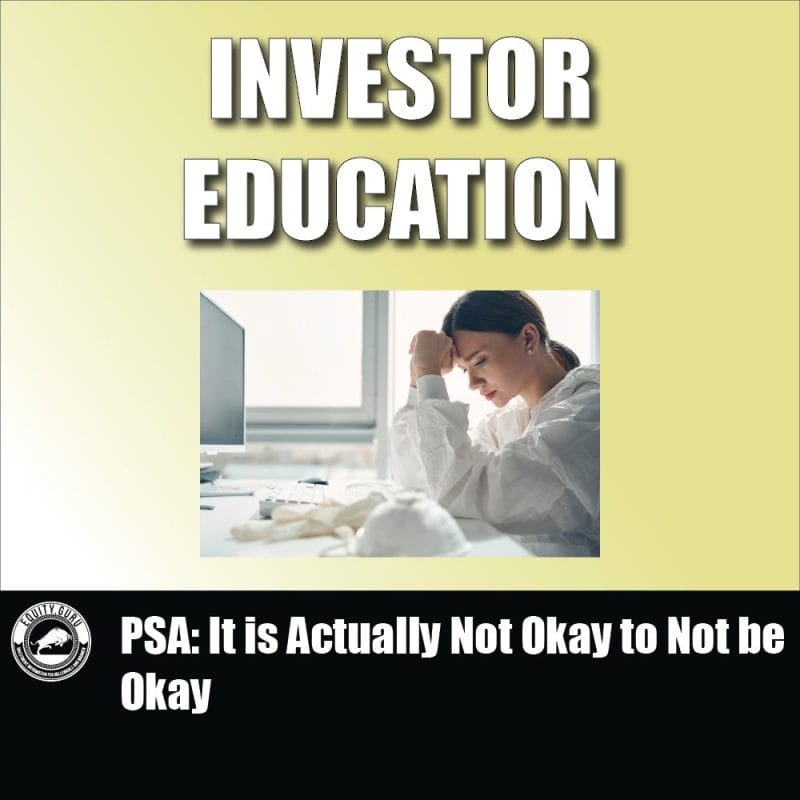My mother tells me that “it is okay to not be okay”.
This sort of thing comforts me for a moment until I realize that this quirky little phrase can only derive from one place: there are people out there saying and behaving like it is not okay to not be okay.
Or (another realization), who out there is so okay that they need to be reminded that it’s okay when they don’t feel okay?
My levels of “okayness” generally meander around a 5, (6 on a good day), out of 10. For example, I may be having a grossly chic hair day but within the hour I may have also stubbed my toe, accidentally eaten a spoonful of expired yogurt, and found a hole in my favorite jeans. “Okayness” is a never-ending balancing act – like the scales of justice piling on the “I just got shit on by a pigeon” (not okay) versus the “I can smell the flowers on my street” (okay).
If you’ve followed thus far, I’m going to go out on a limb and say that you are doing very okay today (speaking for myself, I’m clearly not). Regardless, I think society needs to shift our rhetoric. My pitch: “nobody is ever okay”.
And this seamlessly brings me to the hellish burning firepit that is, the stock market. (It’s not really a hellish burning firepit at all, I just wanted to be dramatic). Evidently, my “okayness” is teetering at a generous 4 today so I figured I’d write a little something to boost everyone’s morale.
If you woke up this morning, looked at your investments, and realized that your money has seemingly evaporated like a bad Criss Angel Mindfreak trick, you are not alone. Here are 5 ways to hedge against a stock market crash…
- Everything is temporary (even a bad haircut) so think about your future earnings
Last week I wrote about historic stock market crashes and their recovery. I managed to put aside all facetious tone for an entire sentence (big of me) and wrote, “If history has demonstrated anything, it’s that volatility, crashes, and corrections are a normal part of the investing cycle, and the price of admission to what’s arguably the greatest wealth creator on the planet”.
A market crash is not evidence of your investments plummeting for the remainder of your existence. Quite the opposite actually – what goes up must come down and all that.
Perhaps the greatest protection is knowing that the vast majority of the money you will invest in your lifetime has not yet been earned. A market crash, if you’re a Buffet type, can be used as an opportunity to acquire shares of the world’s most profitable companies at a discount.
- The stock market is not the only way to make money and you can actually dabble in other investments
This one is self-explanatory. A good way to hedge against a stock market decline is to have your money in something besides stocks. Naturally, there are downsides to not having your money in the most profitable companies in the history of the world – but who says you can’t have it all. Some popular “alternative” asset classes include:
● Real Estate: Make your traditional family proud and buy a house. While in an economic downturn both stocks and real estate can fall in value, the normal response to a crashing stock market (cutting interest rates) is (apparently) very beneficial to real estate investors.
● Precious Metals: When everything is falling out of sorts we can always rely on the tangible (diamonds are a girl’s best friend and all). Precious metals enthusiasts will tell you that things like gold and silver not only retain, but in many cases increase, their value during a market downturn.
● Art and Collectibles: Most of the world’s expensive art is not on display in a museum or even a house. It lives where I’m sure the artist dreamed it to be – held in storage as a hedge against market downturns. The long-term returns are (apparently) around 5-7.5% a year. I literally refuse to talk about NFTs here, but if you must know, you can read about them in this article.
● Commodities: Oil, gas, wheat, coffee, sugar, cotton, and corn, among others, are commodities. There are numerous ways to invest in them (most conveniently via derivatives) and they (again, apparently) tend to do well in inflationary times.
- I know in high school movies everyone sits at their designated brand of lunch table but if the stoners mixed with the band kids, they could probably make some beautiful music
A man named Ben Carlson recently argued that there are a lot of investments that aren’t in a bubble right now – in other words, sometimes the overall market can crash or just one sector crashes, leaving other types of stocks to do quite well. I don’t know Ben Carlson, but his website is called “A Wealth of Common Sense” and I think that’s clever, so I trust him.
He lists various emerging markets, European stocks, Japanese stocks, value stocks, energy stocks, and specific financial stocks. (Apparently, in the 2000-2002 market crash, small-value stocks came out “smelling like a rose”). Remember that glittering word “diversification”?! If you add funky little things like international stocks, small-value stocks, and REITs into your portfolio it might help hedge against a market crash.
How do you get involved in Japanese stocks, you ask? I could not tell you. Ask Ben Carlson.
- The Big Short
The only finance movie reference I have.
In speaking of things I don’t do, shorting the market is one of the easiest ways to make money when the market falls. To break it down for the novice, when you short the market, you borrow a stock from someone else to sell it. Then, after the price falls, you buy the stock and pay back the person you borrowed it from. (Obviously, you must pay interest on what you borrowed – nothing comes for free in this world).
(PSA: I am not recommending you short the market – not that you should take my investment advice in general – I am wildly unaccredited. But shorting is sketchy business. Like, you can lose your entire net worth and be forced into bankruptcy type of sketchy).
If you want to learn more about shorting the market, I wrote a whole thing about it here.
- Put Options are honestly more complicated than they sound and I am exhausted thinking about it
Last May I made the terrible mistake of learning and subsequently writing about options. The articles are:
Hi Options, Nice to Meet You (Not Really)
The Options Chain and Everything that Follows
The 4 Options Trading Positions
I vowed to never speak of it ever again. Unfortunately, if you’re certain that the market is going to fall, you can bet against it by buying a type of option called a “put”.
If you want to hedge against a market decline, put options certainly work. There are valid business uses of options and futures (and other things we don’t care about). For instance, they allow a farmer to hedge against unpredictable weather and insects. They allow an airline to hedge against a rise in the cost of oil. Etc., Etc.
Most of the activity in derivative markets is purely speculative. When you win someone else loses, and the overall expected return after costs is negative. If you can’t explain it, I would avoid it. And that, I think, seems like a good lesson for everything in life.
Until next week.


